Publications & Projects
2025
Lanta, V., Doudová, J., Černý T., Čížek, L., Chlumská, Z., Dvorský, M., Havrdová, A., Karlík, P., Korznikov, K., Doležal, J., & Douda, J. (2025). Vegetation changes in temperate floodplain forests: temporal scale matters. Journal of Vegetation Science: 36:e70094.
Vassilev, K., Genova, B., Georgiev, S., Dimitrov, M., Nazarov, M., Nikolov, I., … Douda, J., … & Velev, N. High-rank syntaxa of riparian shrubland and forest vegetation in Bulgaria. Forestry Ideas, 31: 89–117.
Douda, J., Doudová, J., & Havrdová, A. (2025). Resource limitation and competition shape reproductive allocation and synchrony. Oikos: e11417.
Holeštová, A., Havrdová, A., Černá, M., Doudová, J., Boublík, K. & Douda, J. (2025). From past diversity to present decline: Age heterogeneity and plant composition shifts in Central European floodplain forests. Forest Ecology & Management, 587: 122732.
Häusler, J., Douda, J., Boublík, K., & Doudová, J. (2025). Managing light and nutrients to restore plant diversity in temperate woodlands. Biological Conservation, 306: 111130.
Eusebio, L. & Douda, J. (2025). Revisiting Ancient Forests: Insights From the Mid-Pliocene to Predict Future Climate Impacts. Journal of Biogeography, e15128.
Havrdová, A., Douda, J., Boublík, K., Doudová, J., Král, P., Černý, K., Pecka, Š., Zahradník, D., Strnadová, V., Sucharová, J. & Vojta, J. (2025). Decadal decline in herbaceous species richness in wetland forests: Effects of an introduced pathogen and environmental change. Forest Ecology & Management, 583: 122569.
Král, P. & Douda, J. (2025). Introducing Rveg: An R Package for Phytosociological Data Digitizing. Journal of Vegetation Science, 36: e70012.
2024
Doudová, J., Prach, J. a kol. (2024): Odstraňování opadu jako nástroj ochrany vegetace světlých lesů. Praha: AOPK ČR, 62 s. [ke stažení].
Holeštová, A. (2024). Vegetation dynamics and biodiversity conservation in floodplain forests of regulated rivers. Czech University of Life Sciences Prague, Faculty of Environmental Sciences. Doctoral dissertation. Pdf File 📄
Holeštová, A., Doudová, J., Havrdová, A., Černá, M., Boublík, K., & Douda, J. (2024). Contrasting responses of forest phenological guilds to complex floodplain change. Journal of Ecology, 112, 1397–1412.
2023
Slezák, M., Douda, J., Hegedüšová Vantarová, K., Jarolímek, I., Kochjarová, J., Májeková, J., & Hrivnák, R. (2023). Soil toxicity and species dominance rather than nutrient availability drive plant species richness in swamp forests of Central Europe. Journal of Biogeography.
Černý, K., Vojta, J., Pecka, Š, Chumanová, E., Koukol, O., Douda, J., Boublík K., Doudová, J., Havrdová A. & Král, P. (2023). Invazní patogen ohrožuje lužní a mokřadní olšiny. Živa, 6, 279-282.
Douda, J., Doudová, J., Holeštová, A., Chudomelová, M., Vild, O., Boublík, K., Černá, M., Havrdová, A., Petřík, P., Pychová, N., Smyčková, M., Šebesta, J., Vaníček, J. & Hédl, R. (2023). Historical sampling error: A neglected factor in long-term biodiversity
change research. Biological Conservation 286, 110317.
Doudová, J., Douda, J., Boublík, K. & Prach, J. (2023). Odstraňování opadu jako opomíjený nástroj světlých lesů. Živa, 2, 62-66.
Havrdová, A., Douda, J. & Doudová, J. (2023). Threats, biodiversity drivers and restoration in temperate floodplain forests related to spatial scales. Science of The Total Environment, 158743.
2022
Doudová, J., Douda, J. & Boublík, K. (2022). Traditional human practices protect diversity of open forests threatened by ticking nutrient time bomb. Biological Conservation, 275, 109758.
Divíšek, J., Večeřa, M., Welk, E., Danihelka, J., Chytrý, K., Douda, J., & Chytrý, M. (2022). Origin of the central European steppe flora: insights from palaeodistribution modelling and migration simulations. Ecography, e06293.
Šmíd, J., Vít, P., Douda, J., Krak, K., & Mandák, B. (2022). Distribution, hybridisation and morphological variation in Alnus rohlenae (Betulaceae) an endemic species of the Balkan Peninsula. European Journal of Forest Research, 141(4), 641-648.
Slezák, M., Douda, J., Šibíková, M., Jarolímek, I., Senko, D., & Hrivnák, R. (2022). Topographic indices predict the diversity of Red List and non-native plant species in human-altered riparian ecosystems. Ecological Indicators, 139, 108949.
2021
Mandžukovski, D., Čarni, A., Biurrun, I., Douda, J., Škvorc, Ž., Stupar, V., Slezák, M., Ćušterevska, R., Rodríguez-González, P.M., Mendías C.S., Portela-Pereira, E., Vassilev, K., Milanovič, Đ., Kavgaci, A., Iakushenko, D., Pielech, R., Jasprica, N., González del Tánago, M., Dufour, S., Šibíková M., & Šibík, J. (in press). Manual for riparian alliances on European level, pp. 1-148.
Douda, J., Havrdová, A., Doudová, J., Boublík, K., Černá, M., & Holeštová, A. (in prep.). Ztráta druhové diverzity lužních lesů a doporučení k její ochraně, pp. 1-42.
Douda, J., Doudová, J., Holeštová, A., Boublík, K., Havrdová, A., & Slezák, M. (2021). Interplay of above‐and belowground resource limitations: a competition–facilitation shift maintains species coexistence. Oikos, 130 (12), 2122-2135.
Holeštová, A., & Douda, J. (2021). Plant Species Over-Occupancy Indicates River Valleys Are Natural Corridors for Migration. Plant Ecology, 223 (1), 71-83.
2020
Doudová, J., & Douda, J. (2020). Along with the intraspecific functional trait variation, individual performance is key to resolving community assembly processes. Functional Ecology, 34 (11), 2362-2374.
Šmíd, J., Douda, J., Krak, K., & Mandák, B. (2020). Analyses of Hybrid Viability across a Hybrid Zone between Two Alnus Species Using Microsatellites and cpDNA Markers. Genes, 11(7), 770.
Douda, J., Havrdová, A., Janda, P., & Mandák, B. (2020). Molecular assessment of natural disturbance regime in a temperate swamp forest. Forest Ecology and Management, 460, 117821.
Vít, P., Krak, K., Douda, J., & Mandák, B. (2020). Microsatellite markers for Anthericum ramosum: Development, characterization, and cross‐species amplification. Applications in Plant Sciences, 8(2), e11323.
Douda, J., Doudová, J., Hodková, E., Vít, P., Krak, K., & Mandák, B. (2020). Population history explains the performance of an annual herb–Within and beyond its European species range. Journal of Ecology, 108(3), 958-968.
Krak, K., Vít, P., Douda, J., & Mandák, B. (2020). Development of 18 microsatellite markers for Salvia pratensis. Applications in Plant Sciences, 8(1), e11316.
2019
Chytrý, M., Hájek, M., Kočí, M., Pešout, P., Roleček, J., Sádlo, J., Šumberová, K., Sychra, J., Boublík, K., Douda, J., … & Chobot, K. (2019). Red list of habitats of the Czech Republic. Ecological Indicators, 106, 105446.
Hodková, E., Doudová, J., Douda, J., Krak, K., & Mandák, B. (2019). On the road: Postglacial history and recent expansion of the annual Atriplex tatarica in Europe. Journal of Biogeography, 46(11), 2609-2621.
Krak, K., Habibi, F., Douda, J., Vít, P., Lomonosova, M. N., Wang, L., & Mandák, B. (2019). Human‐mediated dispersal of weed species during the Holocene: A case study of Chenopodium album agg. Journal of Biogeography, 46(5), 1007-1019.
2018
Vojík, M., & Boublík, K. (2018). Fear of the dark: decline in plant diversity and invasion of alien species due to increased tree canopy density and eutrophication in lowland woodlands. Plant Ecology, 219(6), 749-758.
Mandák, B., Krak, K., Vít, P., Lomonosova, M. N., Belyayev, A., Habibi, F., Wang. L., Douda, J., & Štorchová, H. (2018). Hybridization and polyploidization within the Chenopodium album aggregate analysed by means of cytological and molecular markers. Molecular Phylogenetics and Evolution, 129, 189-201.
Douda, J., Doudová, J., Hulík, J., Havrdová, A., & Boublík, K. (2018). Reduced competition enhances community temporal stability under conditions of increasing environmental stress. Ecology, 99(10), 2207-2216.
Douda, J., Havrdová, A., Doudová, J., & Mandák, B. (2018). Legacy of post‐glacial colonization affects β‐diversity: Insights into local community assembly processes. Journal of Biogeography, 45(7), 1604-1615.
2017
Vít, P., Douda, J., Krak, K., Havrdová, A., & Mandák, B. (2017). Two new polyploid species closely related to Alnus glutinosa in Europe and North Africa–an analysis based on morphometry, karyology, flow cytometry and microsatellites. Taxon, 66(3), 567-583.
Douda, J., Boublík, K., Doudová, J., & Kyncl, M. (2017). Traditional forest management practices stop forest succession and bring back rare plant species. Journal of Applied Ecology, 54(3), 761-771.
Doudová, J., Douda, J., & Mandák, B. (2017). The complexity underlying invasiveness precludes the identification of invasive traits: a comparative study of invasive and non-invasive heterocarpic Atriplex congeners. PLoS One, 12(4), e0176455.
Hulík, J., & Douda, J. (2017). Germination strategies of two dominant Carex species in a swamp alder forest: implications for restoration. Biologia, 72(4), 370-377.
2016
Douda, J., Hulík, J., & Doudová, J. (2016). Vegetative sprouting as an additional pathway for a seed size-number trade-off: a field-parameterised simulation approach. Community Ecology, 17(2), 205-215.
Mandák, B., Krak, K., Vít, P., Pavlíková, Z., Lomonosova, M. N., Habibi, F., … & Douda, J. (2016). How genome size variation is linked with evolution within Chenopodium sensu lato. Perspectives in Plant Ecology, Evolution and Systematics, 23, 18-32.
Vít, P., Krak, K., Trávníček, P., Douda, J., Lomonosova, M. N., & Mandák, B. (2016). Genome size stability across Eurasian Chenopodium species (Amaranthaceae). Botanical Journal of the Linnean Society, 182(3), 637-649.
Krak, K., Vít, P., Belyayev, A., Douda, J., Hreusová, L., & Mandák, B. (2016). Allopolyploid origin of Chenopodium album s. str.(Chenopodiaceae): a molecular and cytogenetic insight. Plos One, 11(8), e0161063.
Mandák, B., Havrdová, A., Krak, K., Hadincová, V., Vít, P., Zákravský, P., & Douda, J. (2016). Recent similarity in distribution ranges does not mean a similar postglacial history: a phylogeographical study of the boreal tree species Alnus incana based on microsatellite and chloroplast DNA variation. New Phytologist, 210(4), 1395-1407.
Mandák, B., Vít, P., Krak, K., Trávníček, P., Havrdová, A., Hadincová, V., … & Douda, J. (2016). Flow cytometry, microsatellites and niche models reveal the origins and geographical structure of Alnus glutinosa populations in Europe. Annals of Botany, 117(1), 107-120.
Douda, J., Boublík, K., Slezák, M., Biurrun, I., Nociar, J., Havrdová, A., Doudová, J., … & Zimmermann, N. E. (2016). Vegetation classification and biogeography of European floodplain forests and alder carrs. Applied Vegetation Science, 19(1), 147-163.
2015
Havrdová, A., Douda, J., Krak, K., Vít, P., Hadincová, V., Zákravský, P., & Mandák, B. (2015). Higher genetic diversity in recolonized areas than in refugia of Alnus glutinosa triggered by continent‐wide lineage admixture. Molecular Ecology, 24(18), 4759-4777.
Havrdová, A., Douda, J., & Doudová, J. (2015). Local topography affects seed bank successional patterns in alluvial meadows. Flora-Morphology, Distribution, Functional Ecology of Plants, 217, 155-163.
2014
Świerkosz, K., Reczyńska, K., & Boublík, K. (2014). Variability of Abies alba-dominated forests in Central Europe. Central European Journal of Biology, 9(5), 495-518.
Drašnarová, A., Krak, K., Vít, P., Doudová, J., Douda, J., Hadincová, V., … & Mandák, B. (2014). Cross-amplification and multiplexing of SSR markers for Alnus glutinosa and A. incana. Tree Genetics & Genomes, 10(4), 865-873.
Svoboda, M., Janda, P., Bače, R., Fraver, S., Nagel, T. A., Rejzek, J., Mikolas, M., Douda, J., Boublík, K., & Lehejček, J. (2014). Landscape‐level variability in historical disturbance in primary Picea abies mountain forests of the Eastern Carpathians, Romania. Journal of Vegetation Science, 25(2), 386-401.
Douda, J., Doudová, J., Drašnarová, A., Kuneš, P., Hadincová, V., Krak, K., … & Mandak, B. (2014). Migration patterns of subgenus Alnus in Europe since the Last Glacial Maximum: a systematic review. PLoS One, 9(2), e88709.
2013
Valtera, M., Šamonil, P., & Boublik, K. (2013). Soil variability in naturally disturbed Norway spruce forests in the Carpathians: Bridging spatial scales. Forest Ecology and Management, 310, 134-146.
2012
Douda, J., Doudová-Kochánková, J., Boublík, K., & Drašnarová, A. (2012). Plant species coexistence at local scale in temperate swamp forest: test of habitat heterogeneity hypothesis. Oecologia, 169(2), 523-534.
Doudová-Kochánková, J., Plačková, I., Zákravský, P., Flégrová, M., & Mandák, B. (2012). The importance of phenotypic differentiation and plasticity in the range expansion of the annual Atriplex tatarica (Amaranthaceae). Flora-Morphology, Distribution, Functional Ecology of Plants, 207(10), 744-752.
2011
Hédl, R., Petřík, P., & Boublík, K. (2011). Long-term patterns in soil acidification due to pollution in forests of the Eastern Sudetes Mountains. Environmental Pollution, 159(10), 2586-2593.
Petřík, P., Černý, T., & Boublík, K. (2011). Impact of hoofed game and weather on the vegetation of endangered dry grasslands in the Křivoklátsko Biosphere Reserve (Czech Republic). Tuexenia, (31), 283-299.
Černý, T., Petřík, P., Boublík, K., Kolbek, J., & Adámek, M. (2011). Vegetation with Gagea bohemica in the landscape context. Plant Biosystems-An International Journal Dealing with all Aspects of Plant Biology, 145(3), 570-583.
2010
Boublík, K. (2010). Formalized classification of the vegetation of Abies alba-dominated forests in the Czech Republic. Biologia, 65(5), 822-831.
Douda, J. (2010). The role of landscape configuration in plant composition of floodplain forests across different physiographic areas. Journal of Vegetation Science, 21(6), 1110-1124.
2009
Douda, J., Čejková, A., Douda, K., & Kochánková, J. (2009). Development of alder carr after the abandonment of wet grasslands during the last 70 years. Annals of Forest Science, 66(7), 1-13.
Kochánková, J., & Mandák, B. (2009). How do population genetic parameters affect germination of the heterocarpic species Atriplex tatarica (Amaranthaceae)?. Annals of Botany, 103(8), 1303-1313.
2008
Šamonil, P., Král, K., Douda, J., & Šebková, B. (2008). Variability in forest floor at different spatial scales in a natural forest in the Carpathians: effect of windthrows and mesorelief. Canadian Journal of Forest Research, 38(10), 2596-2606.
Šamonil, P., Šebková, B., Douda, J., & Vrška, T. (2008). Role of position within the windthrow in forest floor chemistry in the flysch zone of the Carpathians. Canadian Journal of Forest Research, 38(6), 1646-1660.
Douda, J. (2008). Formalized classification of the vegetation of alder carr and floodplain forests in the Czech Republic. Preslia, 80(2), 199-224.
Kochánková, J., & Mandák, B. (2008). Biological flora of Central Europe: Atriplex tatarica L. Perspectives in Plant Ecology, Evolution and Systematics, 10(4), 217-229.
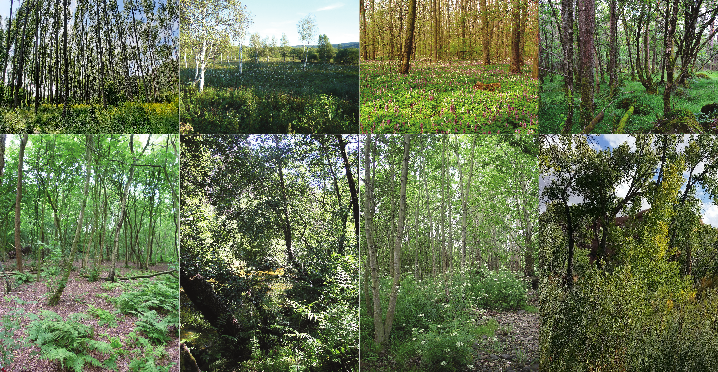
Joint effects of CLimate Extremes and Atmospheric depositioN on European FORESTs (CLEANFOREST)
Our team is a part of a multidisciplinary pan-European network which was established under the COST Action CLEANFOREST. The aim of this Action is to understand the ability of forests to cope with and adapt to more frequent climate extreme events and associated changes in atmospheric depositions. The Action addresses 3 scientific challenges to study the atmosphere-biosphere interactions along the natural-periurban-urban forest continuum in Europe. Challenge 1 focuses on spatio-temporal changes in global change drivers; Challenge 2 addresses interactions between global change drivers and forest ecosystem health and functioning; and Challenge 3 deals with interactions between global change drivers and tree and soil biogeochemical processes. Our team would like to converge the results of our long-term research on floodplain forest vegetation in Europe while working on the above challenges.
Funding:
European Cooperation in Science & Technology (COST)
Action members:
Alena Havrdová, Leandro Eusebio
Project schedule:
28 October 2022 – 27 October 2026
Topic-related results:
Linking performance trade-off with modern coexistence theory and functional trait approach
What mechanisms allow species to coexist? Understanding this question, and a related issue, the maintenance of diversity in local communities, are matters of ongoing debate in community ecology.
The aim is to evaluate the role of performance trade-off for species coexistence under both experimental and natural conditions, together with measurement of species functional responses to competition and to drought stress.
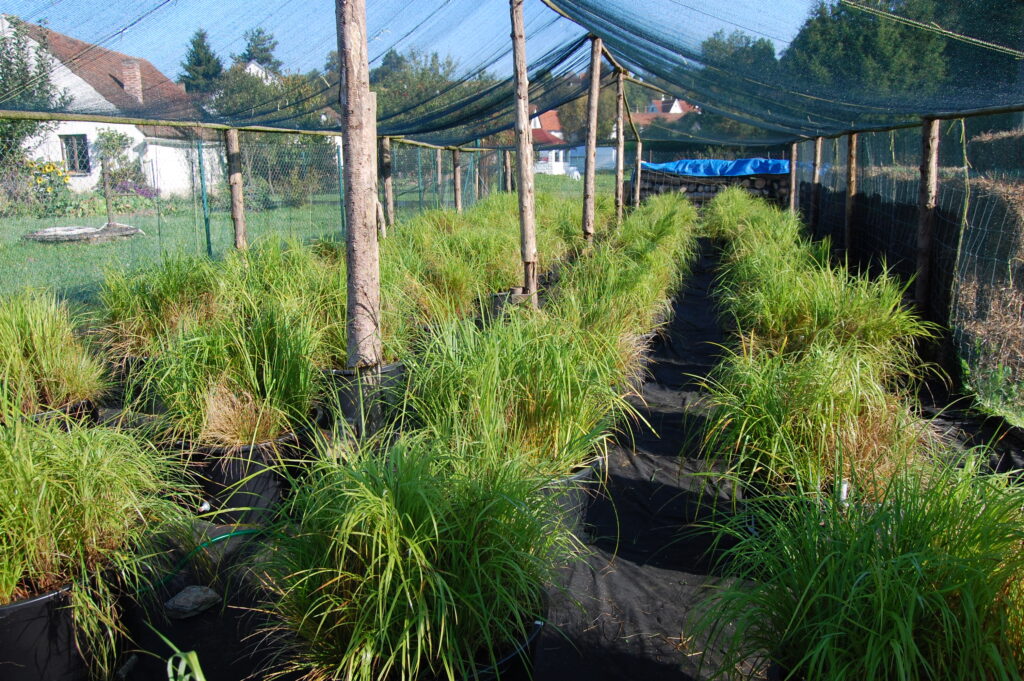
Funding:
Czech Science Foundation (GACR)
Principal investigator:
Jan Douda
Project schedule:
1 January 2023 – 31 December 2025
Topic-related results:
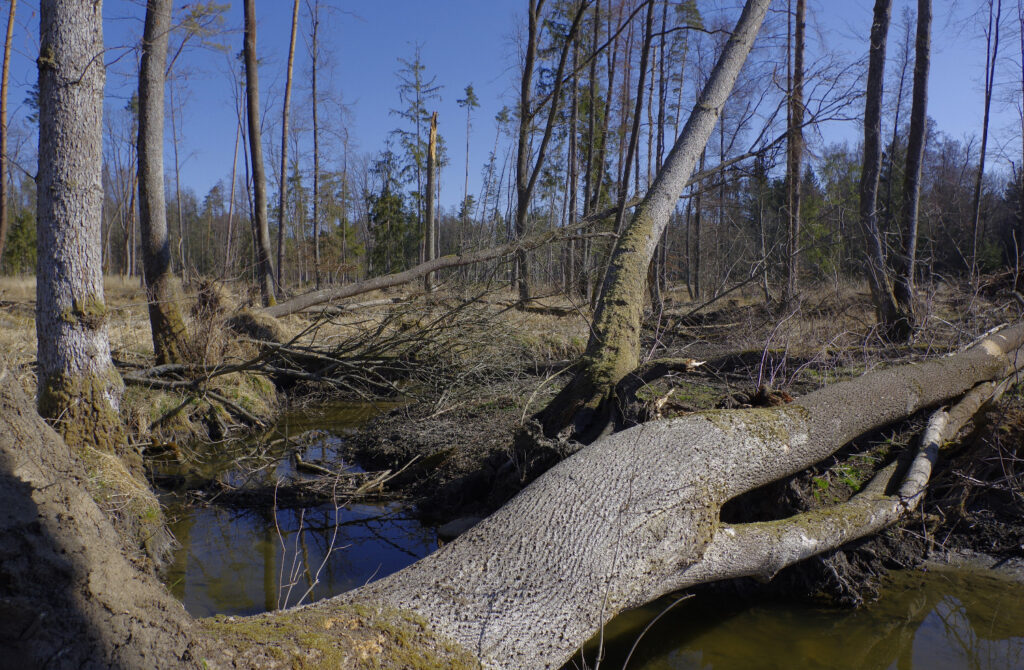
Changes of vegetation and structure of alder carrs and alder alluvial forests infected by alien pathogen Phytophthora alni and assesment of further development
The aim of the project is to identify compositional and structural changes of alder communities invaded by Phytophthora alni, to determine its pathogenicity and make predictions of vulnerability of natural stands. During the project, we will resample the vegetation plots of Alnus dominated stands recorded 20 years ago before pathogen invasion.
Funding:
Technology Agency of the Czech Republic
Co-investigator:
Jan Douda
Project partners:
RILOG (Jaroslav Vojta – principal investigator), Karlova Charles University (Ondřej Koukol)
Project schedule:
1 January 2022 – 31 December 2024
Topic-related results:
Application of traditional knowledge to halt biodiversity loss in woodlands
The aim of the ROTATE Action is to support the biodiversity of organisms associated with traditional forms of forest management (coppicing, pollarding, leaf litter removal) in Central and Northern Europe. Interdisciplinary approach will ensure overcoming of existing barriers that prevent the introduction of knowledge into practice. The outputs will be processed in the form of scientific publications, workshops and conferences and in the form of an approved methodology that will reflect the needs of application guarantors. A wider transfer into practice and sustainability beyond the project is expected, which will be guaranteed by several application guarantors. The outputs will include monitoring of selected groups of organisms and ensuring long-term care of selected sites.
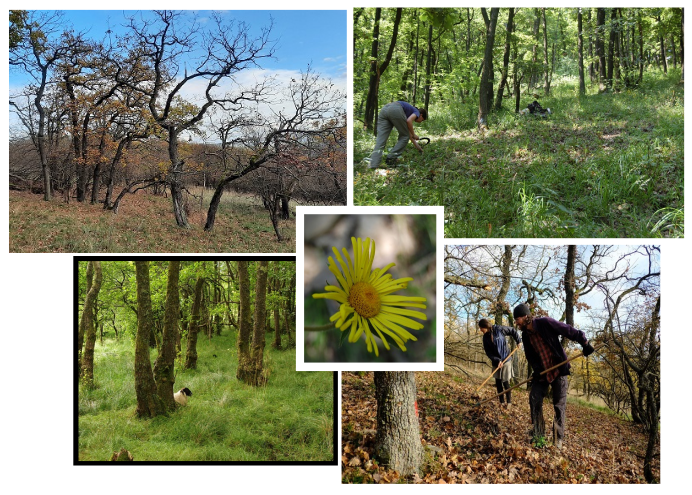
Funding:
EEA and Norway Grants
Principal investigator:
Jana Doudová
Project partners:
NIBIO (Rob Lewis), Institute of Botany (Ondřej Vild), Biological Centre (Lukáš Čížek)
Project schedule:
1 January 2021 – 30 April 2024
Topic-related results:
[Biol Conserv], [Sci Total Environ], [J Appl Ecol], [Environ Hist], [Živa]
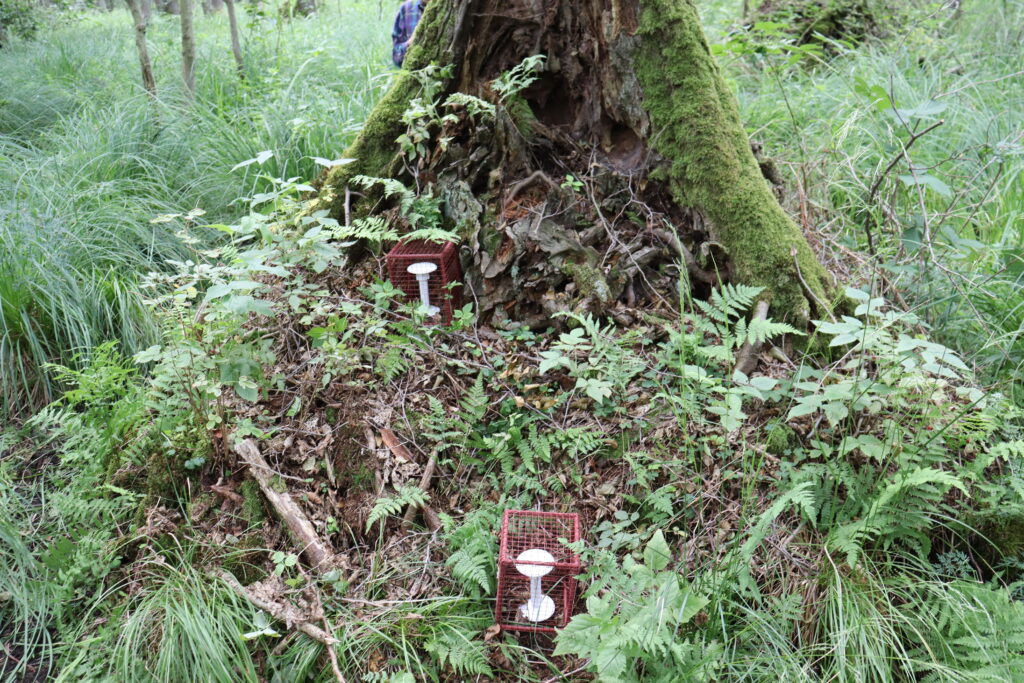
Network establishment for V4 wetland forest protection (NERVE4 Action)
This project begins establishment of long-term monitoring plots in Alder carrs in order to recognize key factors that drives community assembly in Alder carrs and their vulnerability to climate change. Apart from the monitoring network, next results of the projects will be educational brochure and short videofilm together raising awarness of importance and threats of wetland forests, mainly of Alder carr habitats.
Funding:
Visegrad Fund
Coordinators:
Přemysl Král
Jan Häusler
Jan Douda
Project partners:
Centre for Ecological Research (Péter Ódor), University of Agriculture in Kraków (Remigiusz Pielech), Slovak Academy of Sciences (Michal Slezák)
Project schedule:
1 June 2022 – 30 November 2023
The understanding of long-term sustainability of ecosystem services of European floodplain forests
European floodplain forests are among the most important habitats of river ecosystems that have been significantly degraded by human activity although they provide many important ecosystem functions and services. This project actively participates in the international cooperation of CONVERGES Knowledge conversion for enhancing management of European riparian ecosystems and services. The main goal of this project is to increase awareness of the importance of floodplain forests in relation to human activities and pressures (i.e., management practices, climate change).
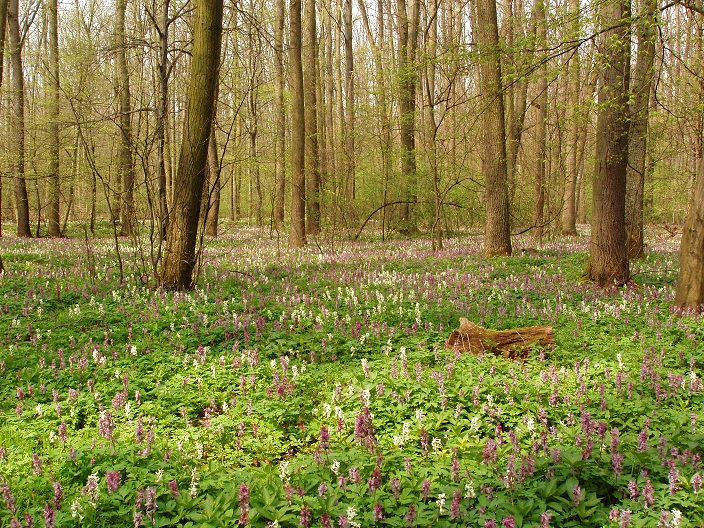
Funding:
Ministry of Education, Youth and Sports
Principal investigator:
Jan Douda
Project schedule:
1 July 2018 – 1 October 2021
Topic-related results:
[Sci Total Environ],
[Appl Veg Sci], [Ecology],
[Funct Ecol], [Oecologia],
[J Biogeogr] , [Methods CZ]
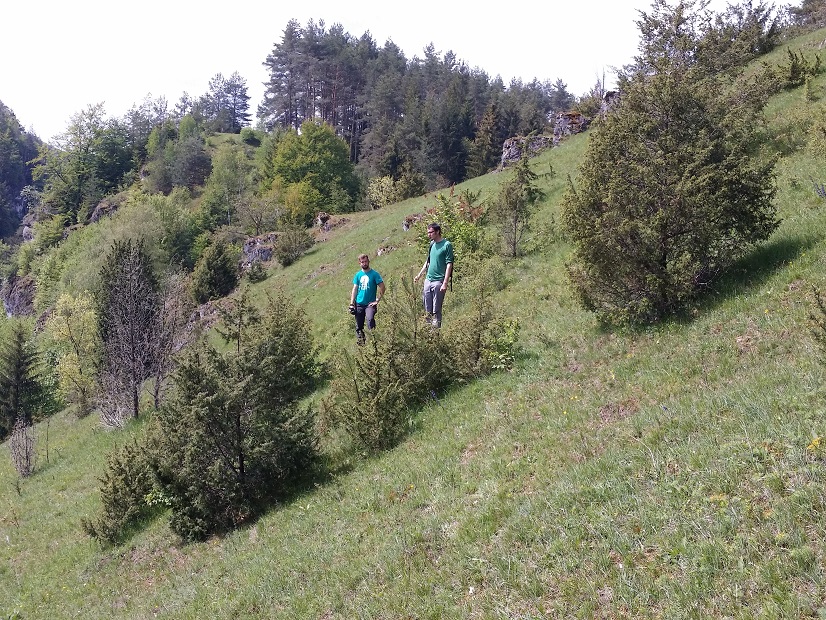
What is the origin of dry grasslands in Central Europe? A synthesis of comparative phylogeography and palaeodistribution modelling
This project aims to shed light upon the glacial and postglacial history of dry grassland species and communities in Central Europe. We will combine data on colonization history with ecological niche modelling to disentangle the history of dry grasslands using modern approaches of community phylogeography. The main hypothesis is that dry grassland species occurring in Central Europe represent community assemblages with similar phylogeographic histories, sharing routes of postglacial expansion and tracking each other through space and time.
Funding:
Czech Science Foundation (GACR)
Principal investigator:
Bohumil Mandák
Project partners:
Masaryk University (Milan Chytrý)
Project schedule:
2018 – 2020
Impact of climatic suitability on expansion at species’ range boundaries
In climatically driven species expansion two alternative scenarios may be expected about the critical processes influencing species potential for range shift. (1) Dispersal, fitness related traits and mating system do not limit species expansion. (2) Expansion is limited by dispersal traits, mating system or fitness related traits. In this case, population history and processes such as genetic admixture may ameliorate species traits related to dispersal and fitness ensuring further expansion. In this project, we will provide insight into processes influencing expansion of annual species Atriplex tatarica at the leading edge of its European distribution. Specifically, we will study if expansion processes are driven simply via centre-abundant model or whether knowledge on specific population history is needed.
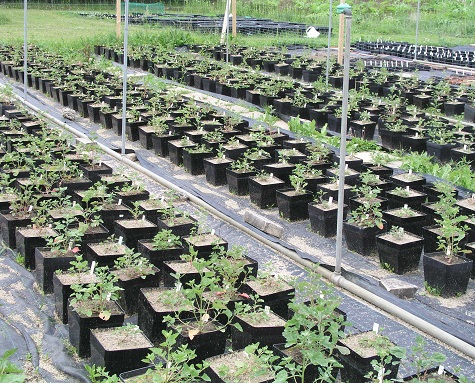
Funding:
Czech Science Foundation (GACR)
Principal investigator:
Bohumil Mandák
Project schedule:
2015 – 2017
Topic-related results:
[J Biogeogr], [J Ecol]
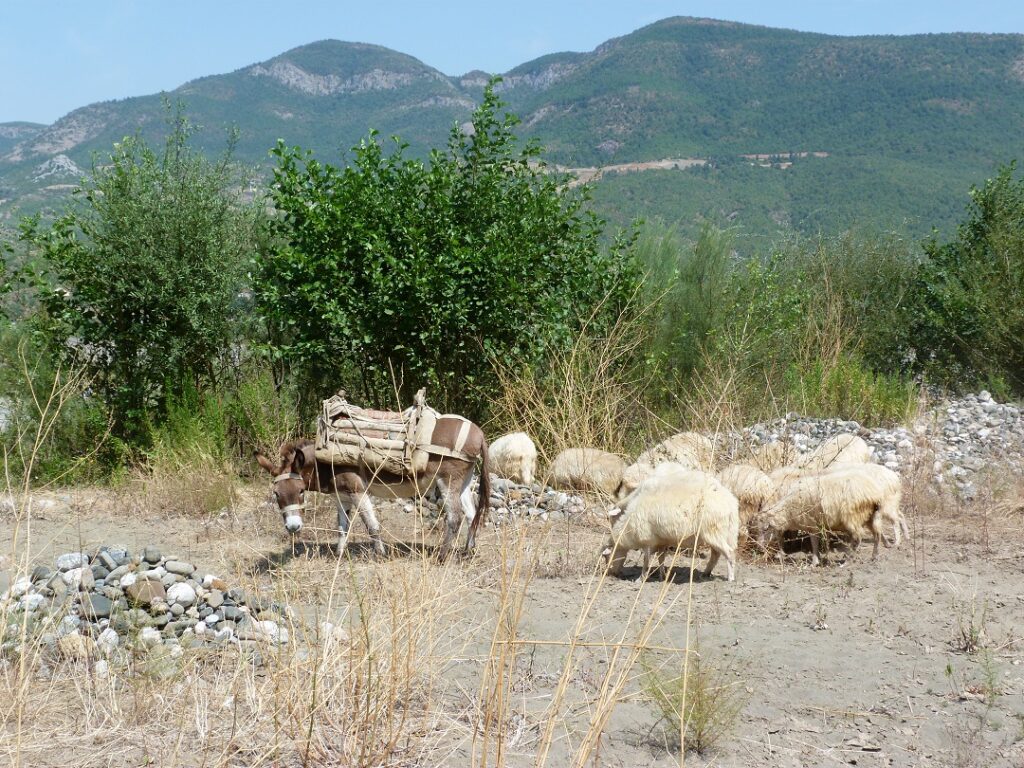
Postglacial colonization of Alnus glutinosa and A. incana: analysis of DNA variation and fossil records
Presently, there is a tendency to believe, that pattern of postglacial colonization was more complicated than the concept following the traditional paradigm of colonization from three southern peninsulas refugia in Europe. In this project, we purpose to discover the postglacial migration routes and late glacial refugia of Alnus incana and A. glutinosa, which appear as a cryptic species in paleobotanical studies. We are addressing these issues by combining both chloroplast DNA and microsatellite markers, which together can provide complimentary insights at different geographical and temporal scales.
Funding:
Czech Science Foundation (GACR)
Principal investigator:
Jan Douda
Project partners:
Institute of Botany (Bohumil Mandák)
Topic-related results:
[Mol Ecol], [PLoS ONE],
[Tree Genet. Genomes],
[Ann Bot], [New Phytol]